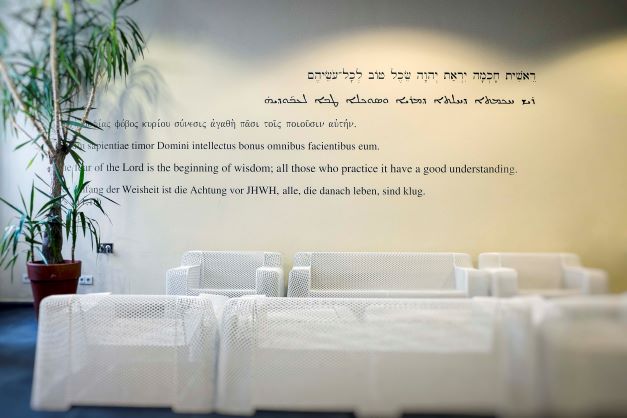Major project on Jewish-Christian dialogue launched at the PLUS
In a project network with German partners and with 1 million euros in third-party funding, the Paris Lodron University Salzburg (PLUS) is launching a major programme on Jewish-Christian dialogue. The aim of the programme is to further develop the Jewish-Christian dialogue both in terms of basic theological research and in the formation of social opinion. After the Shoa the Christian churches have made the renewal of their relationship with Judaism and the Christian-Jewish dialogue one of their central tasks. The director of the new programme is the fundamental theologian Gregor Maria Hoff.
Never again! This was the motto of the Jewish-Christian talks initiated by individuals, Jewish and Christian pioneers, after the Second World War and the National Socialist genocide of 6 million European Jews. The Christian churches had to reflect on their complicity and the effects of a Christian anti-Judaism that had existed for centuries. In moving towards a rapprochement of Christianity with Judaism, the Second Vatican Council (1962-1965) represented the decisive turning point for the Catholic Church in its relationship with Judaism, explains Gregor Maria Hoff, the director of the new programme on Jewish-Christian dialogue at the University of Salzburg. ” In 1965, with the Nostra Aetate declaration, the Catholic Church took the step away from a ‘doctrine of contempt’ (Jules Isaac) towards a theological recognition of Judaism. Not only can Christianity not be understood without Judaism, but it also relies on it in terms of revelation theology. ” God continues to work among the people of the Old Covenant” is how Pope Francis phrased it”.
Since the founding of the “Centre for Intercultural Theology and Religious Studies” at the Paris Lodron University of Salzburg (PLUS) in 2006, Jewish-Christian dialogue has been one of the special agendas, “precisely because the Christian theological reference to other religions cannot be conducted without fundamental references to Judaism”, says Hoff.
Established under lockdown conditions last year, an interreligious dialogue programme financed by third-party funds has been running at the Centre for Intercultural Theology and the Study of Religions since the academic year 2021/22, in cooperation with the foundation consultancy Porticus, among others. It is part of an interreligious project network with partners such as the non-profit Eugen Biser Foundation in Munich, the Jewish Leo Baeck Foundation in Berlin and the Catholic Academy in Berlin. The Salzburg project is working on the theological foundations of Jewish-Christian dialogue under the title “Developing a Theology of the Interreligious Dialogue from a Jewish-Christian Perspective”. The Salzburg project is working on the theological foundations of Jewish-Christian dialogue under the title “Developing a Theology of the Interreligious Dialogue from a Jewish-Christian Perspective”. Research work is being done, for example, on the theological significance of the land and state of Israel; Julia Feldbauer is pursuing this difficult question in her doctoral studies. The project also focuses on how to shape social opinion in order to change attitudes towards Judaism beyond anti-Judaism and anti-Semitism.
Hoff emphasises that personal contacts are also essential for the project. “We are building up an international research group and holding meetings involving representatives of religious communities. The contact with the International Council of Christians and Jews ( ICCJ: ICCJ – iccj.org) is particularly important here. Members of the Salzburg project take part in the annual conferences. From 2022 onwards, the “Seelisberg Prize” will be awarded in recognition of outstanding services to Jewish-Christian dialogue.
In addition, an international “Network of Young Scholars in Jewish Christian Dialogue” is to be established, coordinated by Hannah Judith. “The fundamental importance of Jewish-Christian dialogue must be determined and developed anew in each generation. An international network of young scholars interested in Jewish-Christian dialogue is therefore essential for the future of Jewish-Christian dialogue,” says Hoff.
In the winter semester 2021/22, the “Centre for Intercultural Theology and Religious Studies” will be hosting Father Dr Christian Rutishauser SJ as a Research Fellow, an outstanding expert in Jewish-Christian dialogue who is invited to lecture all over the world. Rutishauser is a member of the pontifical Commission for Religious Relations with the Jews as well as the respective commissions of the German and Swiss Bishops’ Conferences.
Dr Jehoshua Ahrens, an Orthodox rabbi, will also be working at the Centre as a postdoc for the next few years. “Dr Ahrens was largely responsible for the first statement from Orthodox Judaism on Jewish-Christian dialogue in 2015. The conversation with Orthodox Judaism has taken on a new dynamic since the two statements “To Do the Will of Our Father in Heaven” (2015), initiated by a group of Jewish scholars, and “Between Jerusalem and Rome”, published in 2017 by the Conference of European Rabbis, the Chief Rabbinate in Israel and the Rabbinical Council of America,” as Hoff explains.
Dr Daniel Ross Goodman, a rabbi who, according to Hoff, works at one of the most important intellectual centres of Jewish Orthodoxy in New York, is also part of the project. Prof. Dr. Martin Rötting (Religious Studies) from the PLUS is also part of the research team as an expert in religious studies.
Gregor Maria Hoff has been theologically engaged in Jewish-Christian dialogue for more than 15 years. His approach to the topic stems from his field of expertise, fundamental theology, often also referred to as basic theological research. “As a fundamental theologian, questions of ecclesiology, i.e. the doctrine of the church, are also on my agenda. The Church only exists as a community that is related to its Jewish origins. This applies not only to the past but also to the present and leads us to ask, among other things, how do Jews see Jesus? Keyword: Jesus the Jew. These are questions that have greatly influenced the Jewish-Christian dialogue in recent years.
Hoff is also the theological advisor to the German Bishops’ Conference and the Pontifical Commission for Religious Relations with the Jews.





